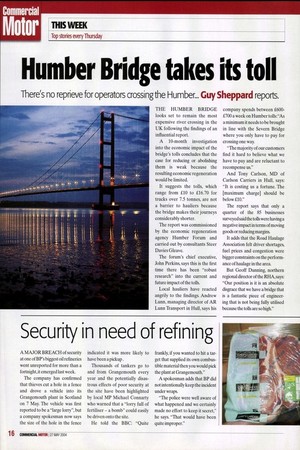Humber Bridge takes its toll
Page 16

If you've noticed an error in this article please click here to report it so we can fix it.
There's no reprieve for operators crossing the Humber... Guy Sheppard reports.
THE HUMBER BRIDGE looks set to remain the most expensive river crossing in the UK following the findings of an influential report.
A 10-month investigation into the economic impact of the bridge's tolls concludes that the case for reducing or abolishing them is weak because the resulting economic regeneration would be limited.
It suggests the tolls, which range from £10 to £16.70 for trucks over 7.5 tonnes, are not a barrier to hauliers because the bridge makes their journeys considerably shorter.
The report was commissioned by the economic regeneration agency Humber Forum and carried out by consultants Steer Davies Gleave.
The forum's chief executive, John Perkins, says this is the first time there has been "robust research" into the current and future impact of the tolls. Local hauliers have reacted angrily to the findings. Andrew Lunn, managing director of AR Lunn Transport in Hull, says his
company spends between £600£700 a week on Humber tolls: "As a minimum it needs to be brought in line with the Severn Bridge where you only have to pay for crossing one way.
"The majority of our customers find it hard to believe what we have to pay and are reluctant to recompense us."
And Tony Carlson, MD of Carlson Carriers in Hull, says: "It is costing us a fortune. The [maximum charge] should be below £.10."
The report says that only a quarter of the 85 businesses surveyed said the tolls were having a negative impact in terms of moving goods or reducing margins.
It adds that the Road Haulage Association felt driver shortages, fuel prices and congestion were bigger constraints on the performance of haulage in the area.
But Geoff Dunning, northern regional director of the RHA, says: "Our position is it is an absolute disgrace that we have a bridge that is a fantastic piece of engineering that is not being fully utilised because the tolls are so high."






























































































































































































